2017-2018 Annexes
Detailed Summary: Access to Scientists
On March 27, 2013, former Information Commissioner Suzanne Legault commenced a systemic investigation into a complaint submitted by the Environmental Law Clinic at the University of Victoria and Democracy Watch. This investigation concluded on February 28, 2018.
Complaint
The complainants alleged that the Communications Policy of the Government of Canada, in combination with institution-specific media relations policies and practices, restricted government scientists from publicly communicating about their research. The complainants also alleged the right of access to information under the Access to Information Act was also impeded by the application of these policies.
The investigation focused on the actions of Environment Canada, the Department of Fisheries and Oceans, Natural Resources Canada, the Canadian Food Inspection Agency, and the National Research Council of Canada (collectively the “subject institutions”) during 2002 to 2014.
Treasury Board Secretariat (TBS) was incorporated into the investigation from the beginning given its role in overseeing both the Communications Policy and the administration of the federal access to information regime.
Investigation
The complainants’ allegations regarding the Communications Policy were evaluated, as well as the media relations policies of each of the subject institutions, to assess if these policies, or their application, impeded access to information rights. The application of these policies was also examined to see whether it contributed to an increase in the number of access to information requests as a means of obtaining information.
Findings
Commissioner Legault made the following findings:
As written, the language of the Communications Policy has not been significantly changed during the period under investigation and is consistent with access to information values and principles.
As written, the language of the various departmental media relations policies reviewed as part of the OIC’s investigation is also consistent with access to information values and principles.
In practice, the Communications Policy and the departmental media relations policies were not being applied by the subject institutions during the period under investigation in keeping with the stated objective of responding to the information needs of the public.
As applied during the period under investigation, the Communication Policy and the departmental media relations policies are impacting upon the federal access to information regime.
The fear observed by the OIC on the part of public servant investigation participants is consistent with the “chill” documented in the survey of over 4,000 federal government scientists conducted by the Professional Institute of the Public Service of Canada and reviewed by the OIC as part of this investigation.
The application of the Communications Policy and the departmental media relations policies during the period under investigation is not consistent with the Government of Canada’s formal commitments to foster and promote Open Government.
Additional Representations since the October 2015 Election
Commissioner Legault sought and obtained from TBS and the subject institutions a comprehensive list of the initiatives undertaken since the October 19, 2015 election that related to the subject matter of this systemic investigation. Following her review of these measures, on September 18, 2017, Commissioner Legault made several recommendations to the President of the Treasury Board to further enhance the government’s response to the concerns raised by the systemic investigation.
Recommendations Made to the President of the Treasury Board by Commissioner Legault
- The government should ensure the Chief Science Advisor is independent from the executive and confer on this position the mandate to ensure that government science is fully available to the public and that government scientists are able to speak freely about their work.
- Government institutions should be required to collect data related to the release of scientific information to the public, including in response to requests by members of the media.
- The Access to Information Act should be amended to require heads of government institutions to make proactive public interest disclosure in relation to information that could affect public safety, public health or environmental protection.
- To protect and support the right of public servants to speak publicly about their subject-matter expertise without fear of reprisal, TBS should:
provide training to public servants on their rights and obligations in publicly communicating science-related information;
identify best practices with respect to the disclosure of scientific information;
identify and correct any weaknesses in the protections and supports provided to public servants in exercising these rights; and
evaluate public servants’ confidence in their ability to speak publicly about their subject-matter expertise.
Government Response to Commissioner Legault’s Recommendations
In a letter dated October 24, 2017, the President of the Treasury Board, The Honorable Scott Brison, provided comments on each of the Commissioner’s four recommendations and outlined steps taken by the government toward making federal science more accessible to the public and empowering federal scientists to speak freely about their work.
Minister Brison noted, for example, that one of the key elements of Chief Science Advisor of Canada Dr. Mona Nemer’s mandate includes providing timely advice on the development and implementation of guidelines that aim to make government science fully available to the public and that aim to ensure that government scientists are able to speak freely about their work.
Minister Brison also noted that key science institutions were already voluntarily collecting data related to the release of scientific information to the public, pointing specifically to the work of Environment and Climate Change Canada and Natural Resources Canada in tracking media relations calls, social media metrics, contribution to peer reviewed articles, and participation in the Open by Default project.
Facts And Figures
Provided are detailed statistical information related to the complaints the Office of the Information Commissioner received and closed in 2017–2018.
Received vs. complaints closed: 2017–2018
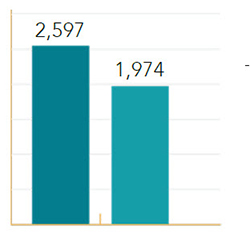
Text Version
This bar chart shows the amount of new complaints received versus the amount of complaints closed by the Office of the Information Commissioner in 2017-2018. The chart shows two bars. The bar on the left shows that 2,597 new complaints were received by the OIC, and the bar on the right shows that 1,974 complaints were closed by the OIC.
- 2597 complaints received
- 1974 complaints closed
Disposition of complaints closed: 2017–2018
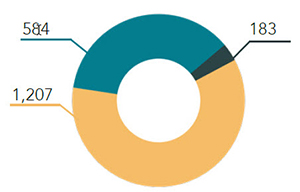
Text Version
This pie chart shows the disposition of complaints closed by the Office of the Information Commissioner in 2017-2018. The largest section of the pie chart shows that 1,207 complaints were discontinued, settled or resolved. The second largest section of the pie chart shows that 584 complaints were well-founded. The smallest portion of the pie chart shows that 183 complaints were not well-founded.
- 584 complaints were well-founded
- 183 complaints were not well-founded
- The remainder of the closed complaints were discontinued, settled or resolved
Explanation of Terminology
Complaints completed with findings
Well-founded The OIC found evidence of the complainant’s rights being denied under the Access to Information Act.
- Well-founded, resolved The institution took remedial action to the satisfaction of the OIC during the course of the investigation.
- Well-founded, resolved with recommendations If the head of the institution accepted the OIC recommendations and remedial action was taken by the institution to the satisfaction of the OIC, the matter is considered resolved and no further action by the OIC is necessary.
- Well-founded, not resolved If the head of the institution did not accept the recommendations of the OIC, or if the remedial action was not to the satisfaction of the OIC, the complainant will be informed that the matter is not resolved and the complainant, or the OIC with the complainant’s consent, can pursue the matter in Court.
Not well-founded As a result of the investigation, the OIC found that the institution applied the Access to Information Act correctly.
Discontinued The complaint was withdrawn or abandoned by the complainant before allegations were fully investigated. In some cases, the complainant did not respond to the OIC’s request for representations within a reasonable time period, or cannot be located.
Settled The complaint was settled to the satisfaction of all parties without the need for the OIC to make a finding.
Resolved For cases of deemed refusal (delay) and extension complaints where the final response to the requester has been sent during the initial stages of the investigation.
Summary of caseload, 2013–2014 to 2017–2018
In 2017–2018, the Commissioner received 2,598 new complaints and closed 1,974. There are 3,489 complaints in the inventory as of March 31, 2018.
| 2013–2014 | 2014–2015 | 2015–2016 | 2016–2017 | 2017–2018 | |
|---|---|---|---|---|---|
| Complaints carried over from the previous year | 1,798 | 2,091 | 2,244 | 3,010 | 2,865 |
| New complaints received | 2,069 | 1,738 | 2,036 | 2,077 | 2,597 |
| New Commissioner-initiated complaints* | 12 | 11 | 11 | 2 | 1 |
| Total new complaints | 2,081 | 1,749 | 2,047 | 2,079 | 2,598 |
| Complaints discontinued during the year | 551 | 407 | 353 | 828 | 554 |
| Complaints settled during the year | 193 | 276 | 71 | 101 | 20 |
| Complaints resolved during the year** | – | – | 67 | 467 | 633 |
| Complaints completed during the year with findings | 1,044 | 913 | 790 | 849 | 767 |
| Total complaints closed during the year | 1,788 | 1,596 | 1,281 | 2,245 | 1,974 |
| Total inventory at year-end | 2,091 | 2,244 | 3,010 | 2,844 | 3,489 |
| Total new written inquiries*** | 248 | 431 | 448 | 468 | 516 |
| Total written inquires closed during the year | 236 | 235 | 633 | 426 | 551 |
*The Commissioner may launch a complaint under subsection 30(3) of the Access to Information Act.
**The Commissioner introduced the “resolved” finding in March 2016. The Commissioner uses it when institutions send their final response to requesters during the initial stages of investigations into deemed refusal (delay) and extension complaints.
***Written inquiries are correspondence the Office of the Information Commissioner (OIC) receives that may result in new complaints under the Access to Information Act. For example, the OIC must determine whether the matter falls within the Commissioner’s jurisdiction before opening a complaint file. Even when a written inquiry does not become a complaint, the OIC must send a response. The OIC began tracking written inquiries in 2011–2012.
New complaints, 2013–2014 to 2017–2018
In 2017–2018, the Commissioner received 1,312 refusal complaints, commonly because the institution concluded no records were available or exemptions were used to decline the disclosure of certain records. A total of 1,249 administrative complaints were also received, about delays, time extensions and fees. Additionally, 37 Cabinet confidence exclusion complaints were received by the OIC.
Administrative complaints represented 48 percent of new complaints, and the remaining 52 percent of complaints were either refusals or Cabinet confidence exclusion complaints.
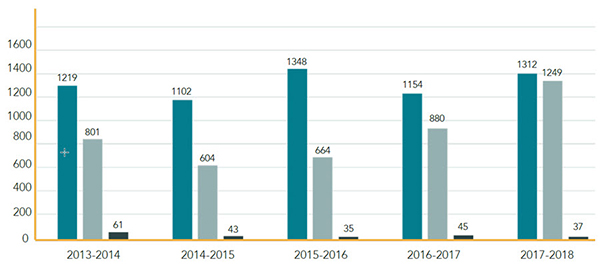
Text Version
The figure is a vertical bar chart showing the number of complaints that the OIC registered for the years 2013-2014 to 2017-2018. There are three categories each year: refusal complaints, administrative complaints and complaints related to Cabinet confidence exclusions.
In 2013–2014, the OIC received 1,219 refusal complaints, 801 administrative complaints and 61 Cabinet confidence exclusion complaints.
In 2014–2015, the OIC received 1,102 refusal complaints, 604 administrative complaints and 43 Cabinet confidence exclusion complaints.
In 2015–2016, the OIC received 1,348 refusal complaints, 664 administrative complaints and 35 Cabinet confidence exclusion complaints.
In 2016–2017, the OIC received 1,154 refusal complaints, 880 administrative complaints and 45 Cabinet confidence exclusion complaints.
In 2017-2018, the OIC received 1,312 refusal complaints, 1,249 administrative complaints and 37 Cabinet confidence exclusion complaints.
Commonly cited exemptions in refusal complaints, 2017–2018
The most commonly cited exemption in refusal complaints in 2017–2018 was section 19. This exemption provides that institutions shall refuse to disclose information containing personal information as defined in section 3 of the Privacy Act.Footnote 1
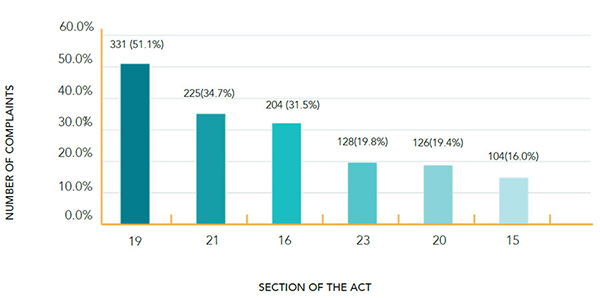
Note: The sum of all percentages may exceed 100 percent, because a single complaint may involve multiple exemptions.
Text Version
The vertical bar chart represents the exemptions that were cited most frequently in the refusal complaints registered in 2017-2018. The X-axis refers to the exemptions under the section of the Act while the Y-axis represents the number of refusal complaints for which the exemption was cited, as a proportion of the total refusal complaints registered.
The results are as follows:
- Personal information (Section 19): 331 complaints (or 51.1% of all refusal complaints registered) evoked this exemption;
- Advice and recommendations to government (Section 21): 225 complaints (or 34.7%) evoked this exemption;
- Law enforcement and investigations (Section 16): 204 complaints (or 31.5%) evoked this exemption;
- Solicitor-client privilege (Section 23): 128 complaints (or 19.8%) evoked this exemption;
- Third-party information (Section 20): 126 complaints (or 19.4%) evoked this exemption;
International affairs (Section 15): 104 complaints (or 16.0%) evoked this exemption.
New complaints by institution, 2013–2014 to 2017-2018
The chart above shows the 20 institutions that were the subject of the most complaints in 2017–2018. Many institutions appear on this list from year to year.
| 2013–2014 | 2014–2015 | 2015–2016 | 2016–2017 | 2017–2018 | |
|---|---|---|---|---|---|
| Royal Canadian Mounted Police | 185 | 178 | 235 | 274 | 435 |
| Immigration, Refugees and Citizenship Canada | 305 | 246 | 181 | 127 | 227 |
| Canada Revenue Agency | 283 | 221 | 271 | 367 | 213 |
| National Defence | 119 | 117 | 93 | 121 | 175 |
| Parks Canada | 9 | 12 | 20 | 4 | 147 |
| Canada Border Services Agency | 106 | 78 | 161 | 153 | 137 |
| Privy Council Office | 48 | 54 | 50 | 82 | 110 |
| Global Affairs Canada | 120 | 83 | 86 | 44 | 88 |
| Health Canada | 48 | 65 | 32 | 60 | 83 |
| National Energy Board | 14 | 1 | 14 | 16 | 79 |
| Public Service and Procurement Canada | 28 | 26 | 78 | 43 | 78 |
| Correctional Service Canada | 56 | 33 | 59 | 52 | 73 |
| Department of Justice Canada | 51 | 44 | 44 | 49 | 61 |
| Transport Canada | 83 | 87 | 57 | 81 | 53 |
| Department of Finance Canada | 19 | 12 | 17 | 35 | 50 |
| Innovation, Science and Economic Development Canada | 42 | 11 | 3 | 19 | 50 |
| Canadian Broadcasting Corporation | 61 | 37 | 25 | 12 | 48 |
| Environment and Climate Change Canada | 29 | 26 | 35 | 35 | 41 |
| Employment and Social Development Canada | 37 | 33 | 38 | 23 | 40 |
| Indigenous and Northern Affairs Canada | 60 | 23 | 31 | 47 | 38 |
| Others (number of institutions) | 451 (66) | 342 (65) | 486 (65) | 372 (69) | 372 (64) |
| Total | 2,081 | 1,749 | 2,047 | 2,079 | 2,598 |
Turnaround times for investigations, 2013-2014 to 2017-2018
Refusal complaints closed within nine months
In 2017-2018, the Commissioner closed 59.1 percent of refusal complaints within nine months of their being assigned to an investigator. The median turnaround time, measuring from the date of assignment, was 203 days. This is an increase of 133 days from 2016–2017. There is a delay of 128 days (median) before a refusal file can be assigned to an investigator.
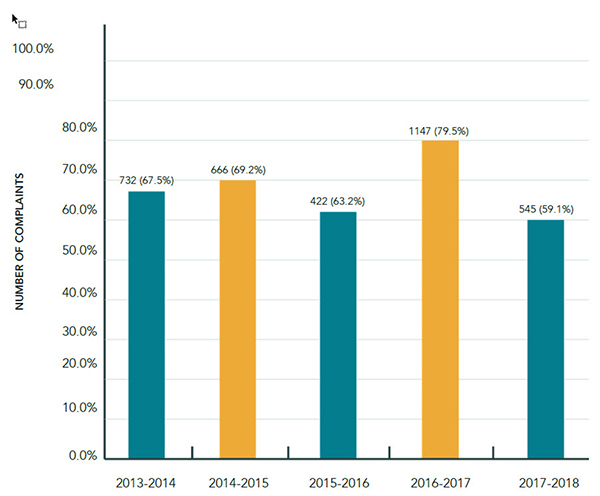
Text Version
This bar chart shows the proportion of refusal complaints that the OIC has closed within nine months after the date on which they were assigned to an investigator from 2013-2014 to 2017-2018.
In 2013–2014, 67.5% of refusal complaints were resolved within nine months (732 complaints).
In 2014–2015, 69.2% of refusal complaints were resolved within nine months (666 complaints).
In 2015–2016, 63.2% of refusal complaints were resolved within nine months (422 complaints).
In 2016–2017, 79.5% of refusal complaints were resolved within nine months (1,147 complaints).
In 2017-2018, 59.1% of refusal complaints were resolved within nine months (545 complaints).
Administrative complaints closed within 90 days
In 2017–2018, the Commissioner closed 69.6 percent of administrative complaints within 90 days of their being assigned to an investigator. The median turnaround time, measuring from the date of assignment, was 39 days. This is an increase of 3 days from 2016–2017. There is a delay of 28 days (median) before an administrative file can be assigned to an investigator.
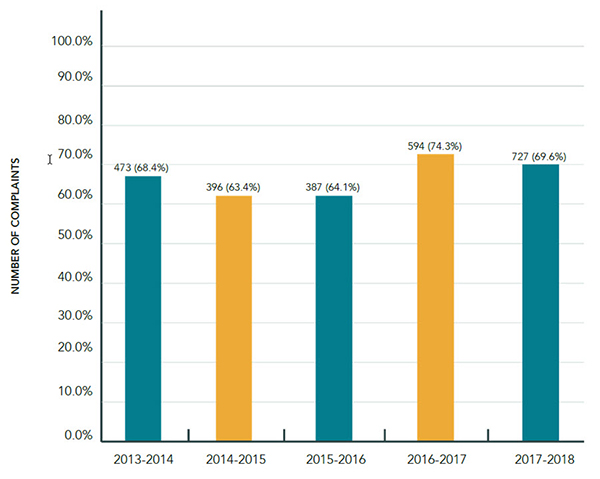
Text Version
This bar chart shows the proportion of administrative complaints that the OIC has closed within 90 days after the date on which they were assigned to an investigator from 2013-2014 to 2017-2018.
In 2013–2014, 68.4% of administrative complaints were resolved within 90 days (473 complaints).
In 2014–2015, 63.4% of administrative complaints were resolved within 90 days (396 complaints).
In 2015–2016, 64.1% of administrative complaints were resolved within 90 days (387 complaints).
In 2016–2017, 74.3% of administrative complaints were resolved within 90 days (594 complaints).
In 2017-2018, 69.6% of administrative complaints were resolved within 90 days (727 complaints).
Complaints closed by institution, 2017–2018
This chart lists the 20 institutions under which the Commissioner closed the most complaints in 2017-2018.
| Overall | With merit | Not well founded | Resolved | Settled | Discontinued | |
|---|---|---|---|---|---|---|
| Royal Canadian Mounted Police | 332 | 80 | 18 | 147 | 1 | 86 |
| Canada Revenue Agency | 202 | 61 | 26 | 60 | 0 | 55 |
| Immigration, Refugees and Citizenship Canada | 183 | 23 | 13 | 110 | 1 | 36 |
| National Defence | 157 | 48 | 17 | 58 | 1 | 33 |
| Canada Border Services Agency | 109 | 38 | 11 | 40 | 0 | 20 |
| Public Service Commission of Canada | 95 | 17 | 5 | 16 | 0 | 57 |
| Transport Canada | 92 | 28 | 3 | 9 | 3 | 49 |
| Health Canada | 71 | 37 | 1 | 23 | 0 | 10 |
| Correctional Services Canada | 62 | 35 | 4 | 20 | 0 | 3 |
| Environment and Climate Change Canada | 50 | 15 | 5 | 19 | 1 | 10 |
| Global Affairs Canada | 46 | 7 | 3 | 5 | 1 | 30 |
| Privy Council Office | 45 | 16 | 7 | 10 | 0 | 12 |
| National Energy Board | 41 | 9 | 0 | 22 | 0 | 10 |
| Department of Justice | 31 | 14 | 5 | 7 | 0 | 5 |
| Innovation, Science and Economic Development Canada | 29 | 16 | 0 | 9 | 1 | 3 |
| Employment and Social Development Canada | 27 | 8 | 0 | 11 | 2 | 6 |
| Financial Transaction and Reports Analysis Centre of Canada | 26 | 0 | 0 | 0 | 0 | 26 |
| Department of Finance Canada | 25 | 3 | 9 | 7 | 2 | 4 |
| Canadian Broadcasting Corporation | 23 | 12 | 9 | 2 | 0 | 0 |
| Natural Resources Canada | 22 | 4 | 8 | 7 | 0 | 3 |
| Canadian Security Intelligence Service | 22 | 2 | 5 | 1 | 0 | 14 |
| Others (65 institutions) | 284 | 111 | 34 | 50 | 7 | 82 |
| Total | 1974 | 584 | 183 | 633 | 20 | 554 |
Report Of The Information Commissioner Ad Hoc For 2017-18
It is my pleasure to report here on the activities of the Office of the Information Commissioner, Ad Hoc. On April 1, 2007, the Office of the Information Commissioner (OIC) became subject to the Access to Information Act (Act). This means that an access to information request can be made to the OIC as an institution to which the right of access to information applies.
The law that brought this about did not, however, create a mechanism separate from the OIC, which oversees government compliance with access requests, to investigate any complaints that access requests to the OIC have not been handled as the Act requires. Since it is a fundamental principle of access to information law that decisions on the disclosure of government information should be reviewed independently, the office of an independent Information Commissioner Ad Hoc was created and given the authority to investigate any such complaints about the OIC.
More specifically, pursuant to subsection 59(1) of the Act, the Information Commissioner has authorized me, as Information Commissioner, Ad Hoc:
…to exercise or perform all of the powers, duties and functions of the Information Commissioner set out in the Access to Information Act, including sections 30 to 37 and section 42 inclusive of the Access to Information Act, for the purpose of receiving and independently investigating any complaint described in section 30 of the Access to Information Act arising in response to access requests made in accordance with the Act to the Office of the Information Commissioner of Canada.
Outstanding complaints from previous year
Our office had no outstanding complaints from the previous year.
New complaints this year
Only one complaint was received this year. This complaint was investigated and disposed of by the end of the fiscal year.
The central issue in the complaint concerned the proper application of paragraph 16.1(1)(c) of the Act. This provision exempts from production information obtained or created in the course of an investigation by the OIC. Once the investigation and all related proceedings are finally concluded, however, the exemption is partially lifted. At that point, the exemption no longer applies to documents created during the investigation. Our investigation revealed that the disputed documents had been obtained during the course of the OIC’s own investigations. I therefore found that the OIC properly applied the mandatory exemption in refusing to disclose the requested documents.
In addition to this one complaint, this Office also received correspondence from a number of individuals who were dissatisfied with how the OIC had investigated their complaints and what they described as the OIC’s delay in issuing findings regarding their complaints. This Office does not have jurisdiction to investigate concerns about how the OIC has investigated complaints made to it as the oversight body under the Act. Nor can my Office investigate concerns about delay by the OIC in processing such complaints. My mandate is limited to receiving and investigating complaints that an access request for a record under the control of the OIC itself may have been improperly handled.
Conclusion
The existence of an independent Information Commissioner Ad Hoc, helps to ensure the integrity of the OIC’s handling of access requests made to it, as an institution, and therefore contributes to the overall system of access to information at the federal level. My Office looks forward to continuing to play this part in access to information.
David Loukidelis QC
Information Commissioner Ad Hoc, for the
Office of the Information Commissioner of Canada
March 2018
Footnotes
- Footnote 1